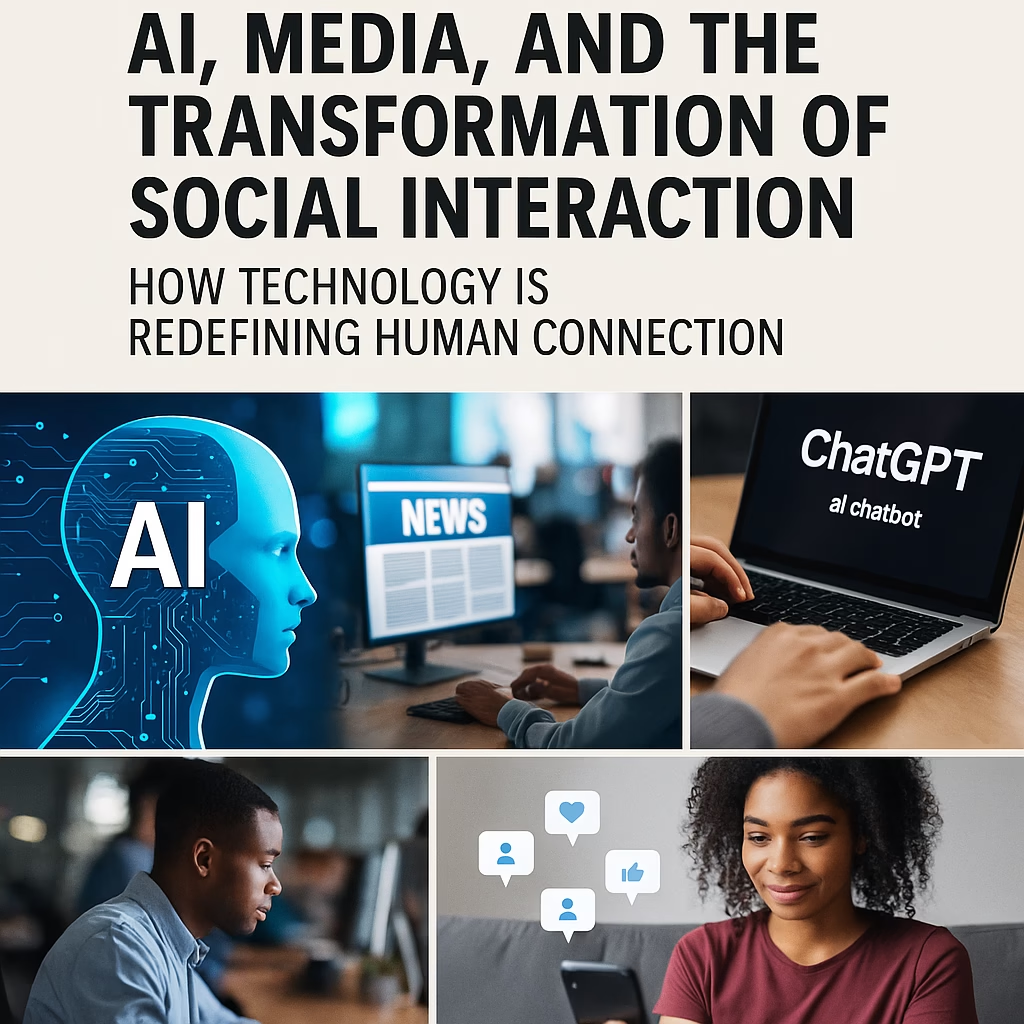AI, Media, and the Transformation of Social Interaction: How Technology Is Redefining Human Connection

The world is entering a new era where artificial intelligence (AI) is not just shaping industries but transforming the very way humans communicate, consume media, and connect socially. From newsrooms to social platforms, AI is changing how information flows, how people engage, and how societies understand truth and reality.
The New Face of Media
Gone are the days when newsrooms depended solely on human reporters to gather, write, and distribute stories. Today, AI algorithms can scan thousands of data points in seconds, summarize breaking news, detect trends, and even write first drafts of articles.
In Ghana, global technology trends are beginning to influence local journalism. Newsrooms are experimenting with AI tools to automate fact-checking, personalize content, and analyze audience behavior in real time.
“This is not about replacing journalists,” says Kwesi Antwi, a media analyst in Accra. “It’s about giving them smarter tools. AI helps reporters focus on deeper storytelling while machines handle repetitive data and analysis.”
AI and the Social Media Revolution
Social platforms — from Facebook and TikTok to X (formerly Twitter) — already rely heavily on AI to recommend content and moderate discussions. But the same technology that curates engaging feeds also shapes public opinion and social interaction in unprecedented ways.
AI determines what we see, who we connect with, and even how we feel about current events. Algorithms learn user preferences and push similar content repeatedly, creating what experts call “echo chambers” — environments where users are exposed only to information that reinforces their existing beliefs.
While this personalization can enhance user experience, it also raises concerns about polarization, misinformation, and digital addiction.
Transformation in Human Communication
The rise of AI chatbots and virtual assistants — such as ChatGPT, Google Gemini, and Meta AI — has introduced a new form of social interaction: human–machine communication. Millions now hold daily conversations with AI for learning, work, or emotional support.
In education, students use AI tools to research, summarize, and brainstorm. In business, chatbots are transforming customer service. On social media, AI-generated influencers now interact with audiences just like real people.
This digital transformation is reshaping human behavior, blending artificial and authentic communication. For younger generations, especially Gen Z and Gen Alpha, virtual interaction is now a normal part of social life.
Ethical and Social Challenges
With innovation comes responsibility. AI’s ability to generate text, images, and videos — including deepfakes — poses serious challenges to journalism, politics, and privacy.
Misinformation powered by AI can spread faster than ever, blurring the line between truth and fabrication. Experts warn that media organizations must adopt strong verification systems and ethical AI frameworks to maintain credibility.
There are also cultural concerns: as people spend more time online with AI companions, traditional forms of face-to-face socialization may weaken. Ghanaian sociologists argue that digital empathy and media literacy must become part of modern education.
AI as a Tool for Empowerment
Despite the risks, AI offers remarkable opportunities for positive transformation.
- In journalism, AI helps detect fake news, monitor hate speech, and improve accessibility for people with disabilities through voice-to-text and translation tools.
- In education, it enables personalized learning and opens access to global knowledge.
- In governance, it can support data-driven decisions that make public communication more transparent and inclusive.
Across Africa, young innovators are already developing local AI applications in agriculture, healthcare, and education — proof that this revolution is not just global, but deeply African.
The Road Ahead
As Ghana and the wider African continent embrace AI, the challenge is not whether technology will replace humans, but how humans will use technology wisely.
Media houses, policymakers, and educators must work together to ensure AI promotes truth, empathy, and social inclusion rather than division and manipulation.
“The future of media is not just about machines,” says digital culture researcher Ama Oforiwaa. “It’s about how we, as humans, use technology to tell our stories, connect authentically, and build a more informed society.”
Conclusion
Artificial intelligence is transforming the media landscape and redefining social interaction — for better or worse. The task before us is clear: to balance innovation with responsibility, automation with authenticity, and technology with humanity.
Only then can AI truly serve as a tool for progress, empowerment, and meaningful human connection.
Source: Nsemgh.com | Technology, Society & Future Dialogue
Follow us for more stories on AI, digital transformation, and social change.

